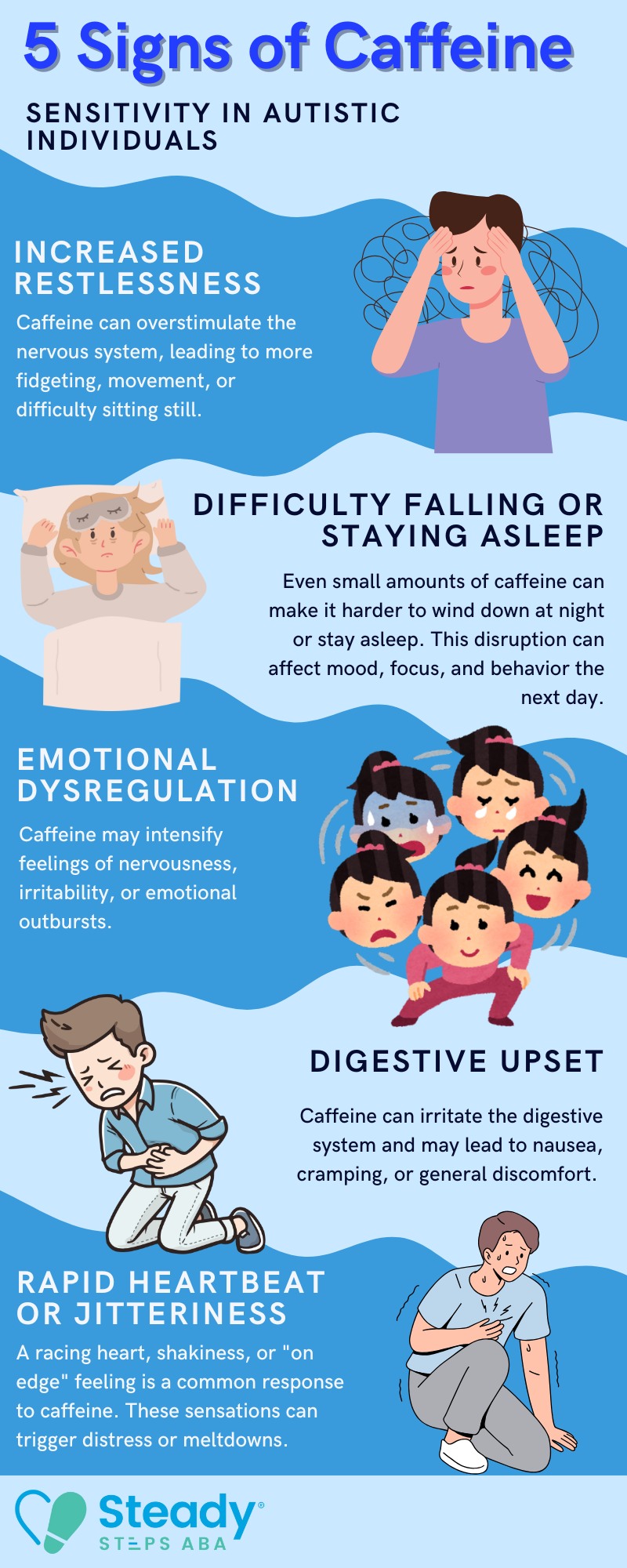Key Points:
- Some individuals with autism experience heightened sensitivity to caffeine, which can affect sleep, anxiety, and focus.
- Caffeine may impact the nervous system differently in autistic individuals due to differences in processing and regulation.
- Monitoring caffeine intake and observing behavioral changes can help families make informed choices.
Caffeine is one of the most commonly consumed stimulants in the world. For many people, it’s a daily ritual, found in coffee, tea, chocolate, soda, and even some medications. But when it comes to autism and caffeine sensitivity, the effects may not be so straightforward.
Research indicates that up to 70% of autistic individuals experience some form of gastrointestinal dysfunction. As these individuals process sensory and chemical input differently, caffeine consumption may lead to certain problems.
Parents, caregivers, and even autistic adults themselves may notice that caffeine has either an amplified or unexpected effect on mood, behavior, or energy levels. In this article, we’ll go over the connection between caffeine and autism and provide safe and supportive decisions around its use.
Is There a Link Between Autism and Caffeine Sensitivity?
Yes, some individuals with autism may be more sensitive to caffeine, experiencing exaggerated or unusual responses compared to neurotypical individuals. These responses can include hyperactivity, irritability, sleep disruptions, or even the opposite—calming or improved focus in certain cases.
The relationship isn’t one-size-fits-all. While caffeine is generally stimulating, its effects on individuals with autism spectrum disorder (ASD) can vary significantly. Some experience agitation and anxiety, while others report better concentration. The variability likely stems from differences in how the nervous system and metabolism handle stimulants.
Why are Some Autistic Individuals Sensitive to Caffeine?
Caffeine affects the central nervous system by blocking adenosine receptors, leading to increased alertness. But for people with autism, who often already have heightened sensory input or neurotransmitter imbalances, this extra stimulation can be too much—or, unexpectedly, it can provide needed focus.
Several factors may contribute to caffeine sensitivity in autism:
1. Neurological Differences
Caffeine affects neurotransmitters like dopamine and serotonin, which may already function differently in autistic individuals. This can lead to stronger or unpredictable reactions to even small amounts of caffeine.
2. Sensory Processing Challenges
For kids with sensory sensitivities, caffeine may heighten awareness of internal sensations like a racing heart or jitteriness. These amplified responses can feel overwhelming or distressing.
3. Sleep Regulation Issues
Many autistic individuals already struggle with falling or staying asleep, and caffeine can make that even harder. Even early-day caffeine may disrupt sleep cycles or delay bedtime.
4. Co-Occurring Conditions Like Anxiety or ADHD
Conditions like anxiety and ADHD are common in autism and can be worsened by caffeine. It may increase restlessness, impulsivity, or feelings of nervousness.
5. Medication Interactions
Caffeine can interact with medications often used to treat neurological or psychiatric conditions, making side effects stronger. It’s important to check with a provider before mixing caffeine with certain prescriptions.
These factors make it difficult to predict how an individual with autism will respond to caffeine, which is why close observation is critical.
5 Common Signs of Caffeine Sensitivity in Autistic Individuals
When someone with autism consumes caffeine, the effects can be immediate or delayed depending on the dose, source, and individual differences. Recognizing signs of heightened sensitivity can help caregivers decide whether to adjust or avoid caffeine intake.
Potential signs of caffeine sensitivity include:

In some cases, caregivers report an opposite effect—caffeine acting as a calming or focusing agent, especially in individuals who also have ADHD.
Can Caffeine Ever Be Helpful for Individuals with Autism?
While caffeine is usually avoided in young children or those with sleep issues, there are instances where low or controlled doses may have positive effects in older autistic individuals, particularly those with attention challenges.
Some research has explored caffeine’s impact on attention and alertness in people with ADHD, and since ADHD and autism can co-occur, it’s possible that similar effects could apply. However, this should never be used as a substitute for professional intervention.
Possible benefits (with supervision) may include:
- Increased task engagement or sustained attention
- Short-term boost in alertness
- Reduction in sensory overwhelm in select cases
That said, these effects are not consistent and may reverse quickly with overuse or dependence.
8 Common Foods and Drinks That Contain Caffeine
Understanding where caffeine hides in a typical diet can help families better monitor intake. Some sources are obvious, while others are more subtle, especially when it comes to snacks and drinks targeted at teens or adults.
Foods and drinks that contain caffeine include:
- Coffee and espresso drinks
- Black and green teas
- Sodas, particularly cola and some root beers
- Energy drinks
- Chocolate (especially dark chocolate)
- Chocolate milk
- Iced teas and bottled coffee drinks
- Certain medications, including pain relievers and weight loss pills
Even small amounts of caffeine can affect sensitive individuals. Chocolate, for example, may seem harmless but can cause noticeable behavioral changes in those who are highly reactive. This raises an important question: Does sugar have a similar effect on those with autism? In our article “Does Sugar Affect Autism? Understanding the Connection,” we dive into how dietary factors, like sugar, can influence behavior and overall well-being in individuals with autism. Understanding these connections can be key in managing triggers and improving quality of life.
How Parents Can Monitor and Manage Caffeine Intake
Managing caffeine for an autistic individual doesn’t always mean cutting it out entirely—it depends on the person. Some do well with limited or occasional intake, while others benefit from complete avoidance. The key is observation, routine, and clear boundaries.
Steps to manage caffeine sensitivity include:
1. Track Reactions to Specific Foods
Keeping a food and behavior journal can help identify patterns tied to caffeine intake. Noting mood, sleep, and physical symptoms after certain drinks or snacks can guide future choices.
2. Limit Intake Gradually
Cutting back slowly can help prevent withdrawal symptoms like headaches, irritability, or fatigue. A gradual approach also gives the body time to adjust without added stress.
3. Replace with Non-Caffeinated Alternatives
Swapping in options like herbal teas, flavored water, or caffeine-free versions of favorite drinks can ease the transition. These alternatives help maintain hydration and routine without added stimulation.
4. Establish Consistent Routines
Reliable routines for eating and sleeping can naturally boost energy and reduce the need for caffeine. Predictability supports regulation and makes the day feel more manageable.
5. Communicate with Care Teams
Sharing observations with ABA therapists, doctors, or other support providers helps create a more coordinated plan. They can help determine whether caffeine might be contributing to behavior changes.
6. Label-Read Carefully, Especially with Processed Foods and Drinks
Caffeine hides in more than just coffee—chocolate, sodas, and even some snack bars may contain it. Reading labels closely helps avoid unintentional consumption and surprises.
Parents can also use behavior logs or visual charts to monitor changes in mood or energy after caffeine exposure. This helps identify patterns and make more informed decisions moving forward.
How Sleep Interact with Autism and Caffeine Sensitivity
Sleep issues are extremely common in individuals with autism. Caffeine, a well-known sleep disruptor, can exacerbate this problem, especially when consumed in the afternoon or evening. Even small amounts can make it harder to wind down, which leads to overtiredness, irritability, and behavioral challenges the next day.
If sleep is already an issue, caffeine should generally be avoided. However, if caffeine is consumed, setting a strict cutoff time (e.g., no caffeine after 12 p.m.) can reduce its impact on nighttime routines.
When Should Families Consider Avoiding Caffeine Completely
Some individuals with autism may benefit from avoiding caffeine altogether, especially if it consistently leads to negative side effects. In these cases, caregivers may notice that even small doses disrupt sleep, increase anxiety, or trigger meltdowns.
It is generally advised to avoid caffeine in the following scenarios:
1. Severe Sleep Disturbances
If your child already struggles with falling or staying asleep, caffeine can make things significantly worse. Removing or reducing it might support a more restful and consistent sleep routine.
2. Anxiety or Stimming Behaviors
Some children become more anxious, agitated, or overstimulated after consuming caffeine. You might notice an increase in stimming, restlessness, or nervous energy.
3. Aggression or Irritability
Caffeine can trigger mood shifts, leading to sudden irritability or even aggressive behaviors. If this pattern appears after certain foods or drinks, it may be worth limiting them.
4. Interactions with Medications or Supplements
Caffeine can affect how medications or supplements work, sometimes making side effects worse. Always consult with a healthcare provider if you suspect a possible interaction.
Always consult with a healthcare provider before making significant dietary changes. Reducing caffeine should be done gradually to prevent withdrawal symptoms.
ABA Therapy’s Impact on Sensory and Behavioral Reactions
Caffeine sensitivity is just one aspect of a broader sensory and behavioral profile. Many children and adults with autism experience challenges related to regulation, focus, or routine, and these can all be affected by dietary elements like caffeine.
Applied Behavior Analysis (ABA) therapy can help families:
1. Identify Behavior Patterns
ABA therapy helps pinpoint patterns in food preferences, sensitivities, and sensory reactions. This understanding allows for more tailored interventions that address specific challenges.
2. Create Visual Supports and Routines
By using visual schedules, prompts, and consistent routines, ABA therapy helps reduce reliance on stimulants like caffeine or sugar. Structured approaches make transitions and mealtimes smoother and less stressful.
3. Increase Tolerance for Change
ABA therapy supports gradual adjustments to routines or food choices, building tolerance for new experiences. Over time, this encourages healthier habits without overwhelming the child.
4. Reduce Problem Behaviors
When overstimulation occurs, ABA therapy teaches coping strategies and ways to manage sensory overload. These techniques can help reduce meltdowns, irritability, or aggressive behaviors during stressful moments.
5. Teach Self-Advocacy
As children grow older, ABA therapy helps them learn how to advocate for their dietary needs. This skill empowers teens to communicate their preferences and make informed decisions about their food choices.
ABA doesn’t treat caffeine sensitivity directly, but it does provide the tools needed to build consistency, track behavior, and support emotional regulation, which are all essential when adjusting diet or routines.
Empower Your Child with ABA Therapy
If you’re exploring behavioral changes related to autism and caffeine sensitivity, structured support can make a real difference. At Steady Steps ABA, we provide ABA therapy in Maryland that helps families identify triggers, build positive habits, and improve emotional regulation in daily life.
Whether you’re managing sensory sensitivities, picky eating, or caffeine-related behaviors, our team creates individualized plans designed to meet your child where they are. We partner with families to strengthen communication, focus, and independence in the home and beyond.
Contact us today to learn how ABA therapy in Maryland can support your child’s development—nutritionally, behaviorally, and holistically.






